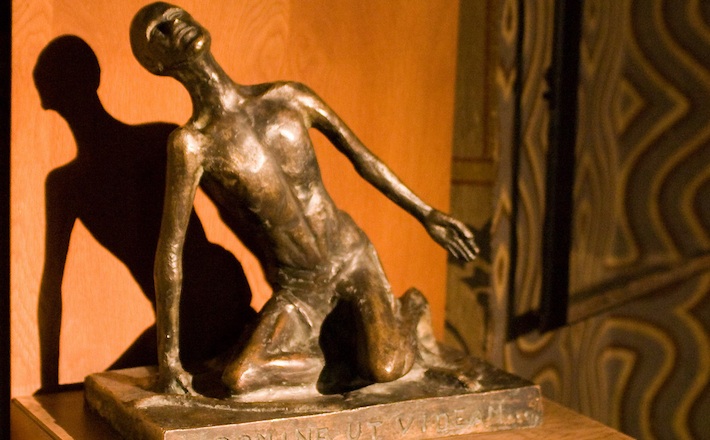Commentary on Mark 10:46-52
This account of the healing of Bartimaeus concludes a central section in the Gospel of Mark that began in 8:22 with the healing of another blind man and is followed in 11:1 by the entry into Jerusalem.
It focuses on establishing Jesus’ identity and mission, and blind Bartimaeus functions in the narrative as someone who truly “sees” Jesus.
As a healing story, the normal elements are present. Someone has a problem, there is some factor that complicates matters, Jesus effects the cure, the result is confirmed, and then there is some response to the miracle. Within this passage and elsewhere in Mark’s gospel, however, are indicators that he has other interests in mind. Mark 10:46-52 is not simply a healing story, but it is also a call story, and Bartimaeus is an example of a true disciple.
Mark has already reported the healing of a blind man in 8:22-26. Does the reader really need another story to confirm that Jesus can restore sight? In 8:22-26, however, there is the odd detail that after Jesus’ first attempt to heal the man, he sees imperfectly and Jesus needs to act again in order for him to see correctly. I don’t think the Bartimaeus story is told to let us know that Jesus has gotten better at performing sight restorations. Rather, it is a way of indicating that while gaining full sight is progressive, similarly, full insight about Jesus’ identity will also take some development. Peter becomes the example of imperfect vision in the account that immediately follows that first sight healing when he confesses Jesus to be the Messiah. Great! But then he goes on to rebuke Jesus for claiming that his messiahship follows a path of suffering and death. We shall see that Bartimaeus does understand what it means to follow Jesus.
The blind man in Mark 8:22-26 is quite passive, but Bartimaeus certainly is not. Though he cannot see, when he hears that it’s Jesus passing by, he begins crying out, “Jesus, Son of David, have mercy on me!” This is the first time that “Son of David” as a title is applied to Jesus. It clearly is a royal title hearkening back to King David, and this will become evident when Jesus soon enters into Jerusalem and is given a royal, Davidic greeting. (11:10) Further, Bartimaeus is displaying insight into Jesus’ identity that will become clearer to the reader in 12:35-37 when Jesus, invoking Psalm 110:1 asks, “How can the scribes say that the Messiah is the son of David?” For someone who understands and believes in Jesus, it all is perfectly clear. (By the way, Bartimaeus can claim Jesus’ blessing in John 20:29 for those who have not seen yet believed!)
Bartimaeus’ perceptiveness is further confirmed by comparing this story with the preceding one in Mark 10:35-45 (the reading for the previous Sunday in the lectionary). Jesus poses the same question to James and John as he does to Bartimaeus. “What do you want me to do for you?” (10:36, 51) Following as it does on Jesus’ declaration about his upcoming suffering and death (10:33-34), James and John unwisely and uncomprehendingly ask for positions of honor and glory. Bartimaeus, in contrast, asks for sight. Whether or not he’s asking to see for the first time or to see again, narratively the emphasis is on spiritual insight. (Note how the “seeing” theme, drawing upon Isaiah 6:9-10, is connected with understanding in Mark 4:12 and 8:18.)
What is the practical implication for Bartimaeus for acknowledging Jesus as he truly is and for believing in Jesus and his mercy? He gains his sight, and, more importantly, he follows Jesus. Here is where the call aspect of this story becomes clear. In the other call stories in Mark, “following” Jesus is crucial — crucial both in terms of being important and being cross-oriented. Simon, Andrew, James, and John are all called to follow Jesus (1:16-20) as is Levi the tax collector (2:14). The rich man in 10:17-21 is told to sell all and follow Jesus. Regarding true disciples, Jesus is explicit in Mark 8:34, “Let them deny themselves and take up their cross and follow me.” (Is Mark suggesting that Bartimaeus is taking Jesus’ instruction to heart when he includes the odd detail in 10:50 that he throws off his cloak which is perhaps the only property he has?) Most telling, at the end of this account, we do not find a typical reaction to a healing miracle where the person healed or the crowd witnessing the miracle respond with awe or praise. Instead, we are only told that, “Immediately he regained his sight and followed [Jesus] on the way.” (10:50) And where is this way headed? In the very next passage we find Jesus entering Jerusalem and starting the chain of events that will end up at the cross. Bartimaeus truly exemplifies the disciple who sees where the way ahead leads and yet follows and believes Jesus.
That may be a tidy way to wrap things up, but there are some other details in Bartimaeus’ story that beg further consideration. What about the “many” who “rebuke” Bartimaeus for crying out to Jesus? (This “rebuke” is the same word – epitimao — used when Jesus rebukes demons and when Peter and Jesus rebuke each other in their testy exchange in 8:32-33.) Are they seeking to preserve Jesus’ honor? Are they trying to control access to Jesus like the disciples did when they stopped someone casting out demons in Jesus’ name? (9:38-39) Or are they embarrassed about Bartimaeus’ low status as a blind beggar? I fear that many in the church today function with the same good intentions when it comes to the ones whom we welcome. Still, Mark reports that Jesus does not call Bartimaeus directly, but instead, he has them call Bartimaeus, which they then encouragingly do. Is this story then not just about the calling of new disciples but the formation and instruction of existing ones? How do they / we respond when Jesus assumes the embarrassingly low status of the Crucified One?
Finally, in the other call stories, Jesus tells the person to come and / or follow him. He tells Bartimaeus to “Go!” Is “going” the same as “following” when it leads to the cross? It certainly can be when “following” Jesus to the cross becomes “going” and telling others what we have seen and experienced in the one who is the merciful Son of David, Jesus the Messiah.


October 25, 2015